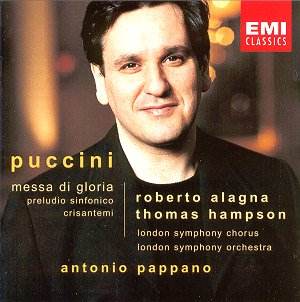 |
Giacomo PUCCINI
(1858-1924) Crotchet
AmazonUK
AmazonUS |
This is a stunning disc which goes to demonstrate just what the advocacy of a masterly conductor and equally fine engineers can achieve. Maestro Pappano's obvious belief in lesser-known Puccini seems to have inspired the London Symphony Chorus and Orchestra to the peak of their abilities.
The idea of a disc of Puccini wrested away from his beloved opera stage might seem a strange, even slightly disquieting, one. Persevere: this is an eye-opening excursion.
The Preludio sinfonico in A major of 1882 is an examination piece from the Milan Conservatory, but heard on its own terms it becomes a real find. It is powerfully emotive and the LSO's phrasing under Pappano is supremely senstive, every inch the equal of Muti's 1997 La Scala performance (Sony SK63025). Crisantemi of 1890 provided material for Act Four of Manon Lescaut. Pappano ensures it receives the tenderest possible performance.
Puccini's first forays into composition were of a predominantly religious bent, and it was their success which inspired him to study at Milan. The Messa a quattro voci (or Messa di Gloria) in A flat of 1880 is on a fairly extended scale and there is no doubting the young Puccini's ambition. If bits sound familiar, they should: there are correspondences with Edgar and also the Madrigal from Act Two of Manon Lescaut.
The fugue at the end of the 'Gloria' (at 'Cum sancto spritu') brings out a less familiar side of this composer. It is superbly performed here, the London Symphony Chorus giving it every inch of life they have got and, most importantly, delineating the lines and textures triumphantly (it could all so easily become muddy). In fact, the choir carry this performance to bring it to the powerful experience it becomes, from the half-toned basses o f the 'Crucifixus' to the peace of 'Et incarnatus est'. They even manage to instill a certain dignity to the main theme of the 'Gloria': quite a feat, as it happens (it is far too jolly for its own good).
Thomas Hampson is by far the better of the two soloists (listen to his beatifully focussed contribution to the 'Benedictus'). Alagna, by contrast, is the only blot on this landscape. He gives out too much in the 'Gratias agimus tibi', destroying the delicate balance of the woodwind, and swoops his way through 'Et incarnatus est'. Everything else in this performance falls beautifully into place, unfortunately throwing Alagna's shortcomings into sharp relief. The solo passages are not extensive, however, and this is not enough to preclude a recommendation.
The competition in the form of Scimone's 1983 Erato performance (with Carreras) on 4509-96367-2 and Inbal (on Philips 434 170-2) cannot compete with this EMI enterprise. Pappano provides a rewarding excursion in to little-charted waters and is, certainly, an eye-opener for those who take the plunge. The stars of the disc remain the London Symphony Chorus, whose unanimity of approach, well-drilled discipline and dedication to the Puccinian cause are beyond reproach.
Colin Clarke